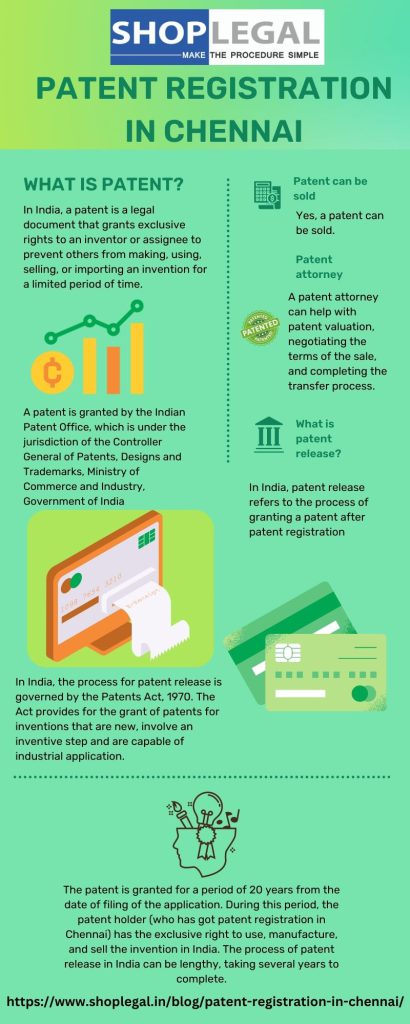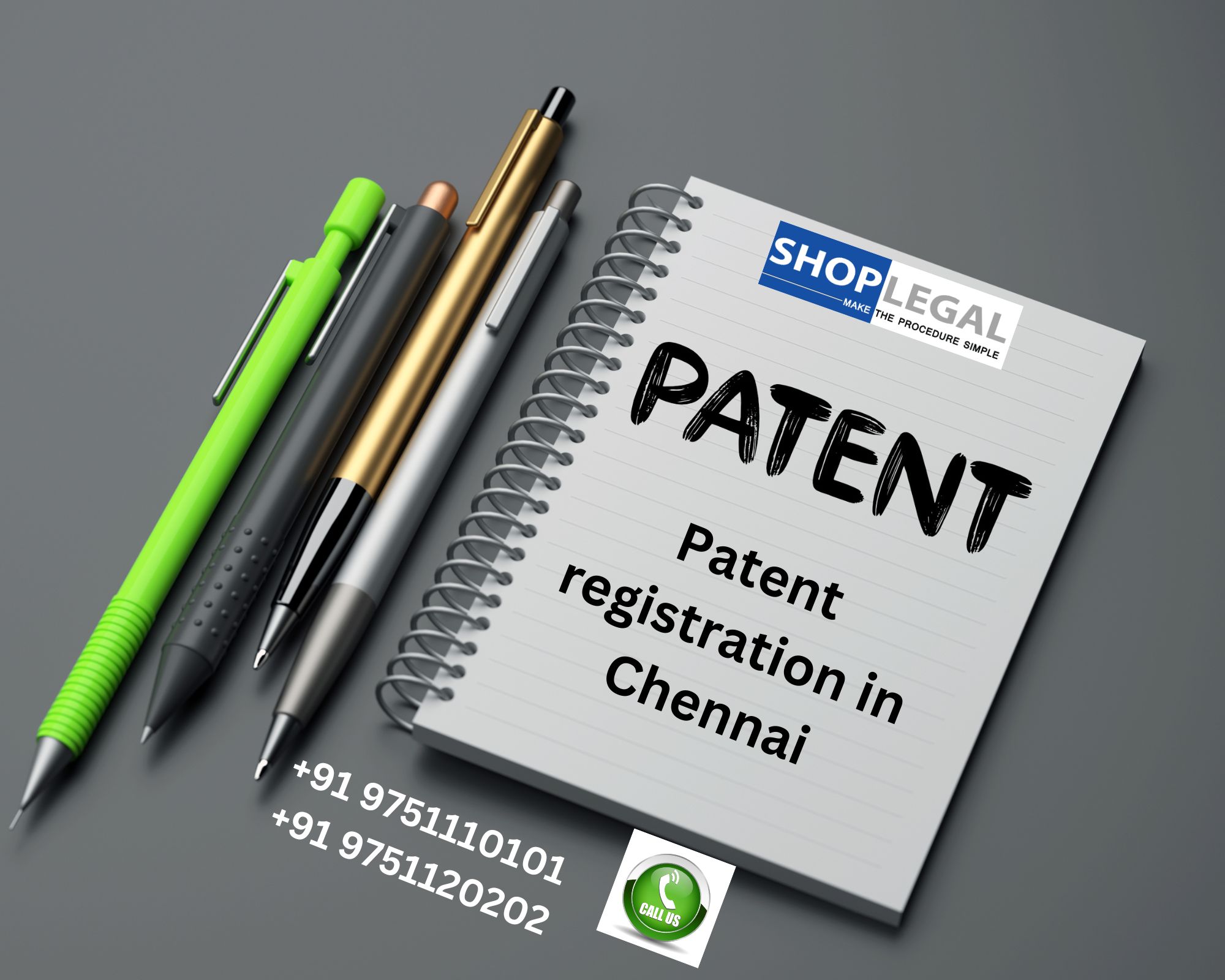Patent registration in Chennai
TALK TO EXPERTS
In India, a patent is a legal document that grants exclusive rights to an inventor or assignee to prevent others from making, using, selling, or importing an invention for a limited period of time. A patent is granted by the Indian Patent Office, which is under the jurisdiction of the Controller General of Patents, Designs and Trademarks, Ministry of Commerce and Industry, Government of India. A patent can have patent registration in Chennai.
The Indian Patents Act, 1970, governs the patent system in India. The Act defines a patent as an exclusive right granted for an invention, which can be a product or a process that is new, involves an inventive step and is capable of industrial application.
Patent registration
The term of a patent in India is 20 years from the date of filing of the patent application. During this period, the patent holder has exclusive rights to the invention and can prevent others from using, making, or selling the invention without their permission. However, after the term of the patent expires, the invention becomes part of the public domain and can be used by anyone.
To obtain a patent registration in Chennai, an inventor or assignee must file a patent application with the Indian Patent Office. The application must include a detailed description of the invention and how it works, along with any drawings or other supporting materials.
The patent application is examined by the Patent Office, which determines whether the invention meets the criteria for patentability, namely novelty, inventive step, and industrial application.
If the patent application for patent registration in Chennai is approved, the patent holder must pay annual maintenance fees to maintain the patent in force. Failure to pay the fees can result in the patent being declared abandoned.
Patent can be sold
Yes, a patent can be sold. In fact, selling a patent is a common practice in the field of intellectual property. When a patent holder sells their patent, they transfer their exclusive rights to the invention to the buyer, who then becomes the new owner of the patent.
There are several reasons why a patent holder may choose to sell their patent.
For example, the patent holder may no longer be interested in commercializing the invention themselves, or they may need to raise funds for their business or personal expenses. Selling a patent that has patent registration in Chennai can also be a way to monetize intellectual property without incurring the costs of bringing the invention to market.
When selling a patent, it is important to determine the value of the patent. This can be done by assessing the potential market for the invention, analyzing the strength of the patent’s claims, and considering the potential licensing fees that could be earned from the patent. Once the value of the patent has been determined, the holder of patent who has got patent registration in Chennai can set a price for the patent and begin searching for potential buyers.
When a buyer is found, the terms of the sale are typically negotiated between the patent holder and the buyer.
The terms of the sale may include the purchase price, any royalties or licensing fees that the buyer may be required to pay to the patent holder, and any restrictions on the use of the invention.
Once the terms of the sale have been agreed upon, the patent transfer process can begin. This involves transferring the ownership of the patent from the patent holder (who has got patent registration in Chennai) to the buyer, which typically involves filing paperwork with the relevant government agency.
The new owner of the patent will also need to pay any maintenance fees required to keep the patent in force.
Patent attorney
It is important to note that selling a patent can be a complex process, and it is recommended that both the holder of the patent who has patent registration in Chennai and the buyer seek the advice of a patent attorney to ensure that the transaction is conducted legally and properly.
A patent attorney can help with patent valuation, negotiating the terms of the sale, and completing the transfer process.
What is patent release?
In India, patent release refers to the process of granting a patent after patent registration in Chennai for an invention that meets the criteria of novelty, inventive step, and industrial applicability.
When patent release?
In India, the process for patent release is governed by the Patents Act, 1970. The Act provides for the grant of patents for inventions that are new, involve an inventive step and are capable of industrial application.
Once a patent application is filed, it undergoes several stages of examination and scrutiny before it is granted.
The first step in the process of patent release is filing a patent application. The application must include a description of the invention, claims that define the scope of the invention, and any drawings or diagrams that may be necessary to explain the invention.
The application for patent registration in Chennai must also include a statement of the invention’s novelty, inventive step, and industrial applicability.
After the application is filed, it undergoes a preliminary examination to determine if it meets the formal requirements of the Patents Act. This includes checking that the application includes all necessary documents and that the claims are clear and concise. If the application meets these requirements, it is published in the Patent Office Journal.
Next, the patent application for patent registration in Chennai undergoes a substantive examination to determine if the invention meets the patentability criteria of novelty, inventive step, and industrial applicability.
This examination is carried out by a patent examiner who is appointed by the Indian Patent Office. The examiner reviews the application and may request additional information or clarification from the applicant.
If the examiner determines that the invention meets the patentability criteria, the patent is granted and published in the Patent Office Journal. The patent is granted for a period of 20 years from the date of filing of the application.
Once the patent is granted after patent registration in Chennai, the patent holder has the exclusive right to use, manufacture, and sell the invention in India.
It is important to note that the process of patent release in India can be a lengthy one, often taking several years to complete.
In addition, the patent holder must pay annual renewal fees to keep the patent in force. Failure to pay these fees can result in the patent being revoked.
In recent years, the Indian government has taken steps to streamline the patent release process and reduce the time taken for examination.
One such step is the introduction of the expedited examination procedure, which allows patent applications for patent registration in Chennai to be examined and granted within a shorter time frame.
The government has also established a number of patent offices across the country to increase the efficiency of the patent release process.
What rights are granted for patent holders?
The patent is granted for a period of 20 years from the date of filing of the application. During this period, the patent holder (who has got patent registration in Chennai) has the exclusive right to use, manufacture, and sell the invention in India. The process of patent release in India can be lengthy, taking several years to complete.








